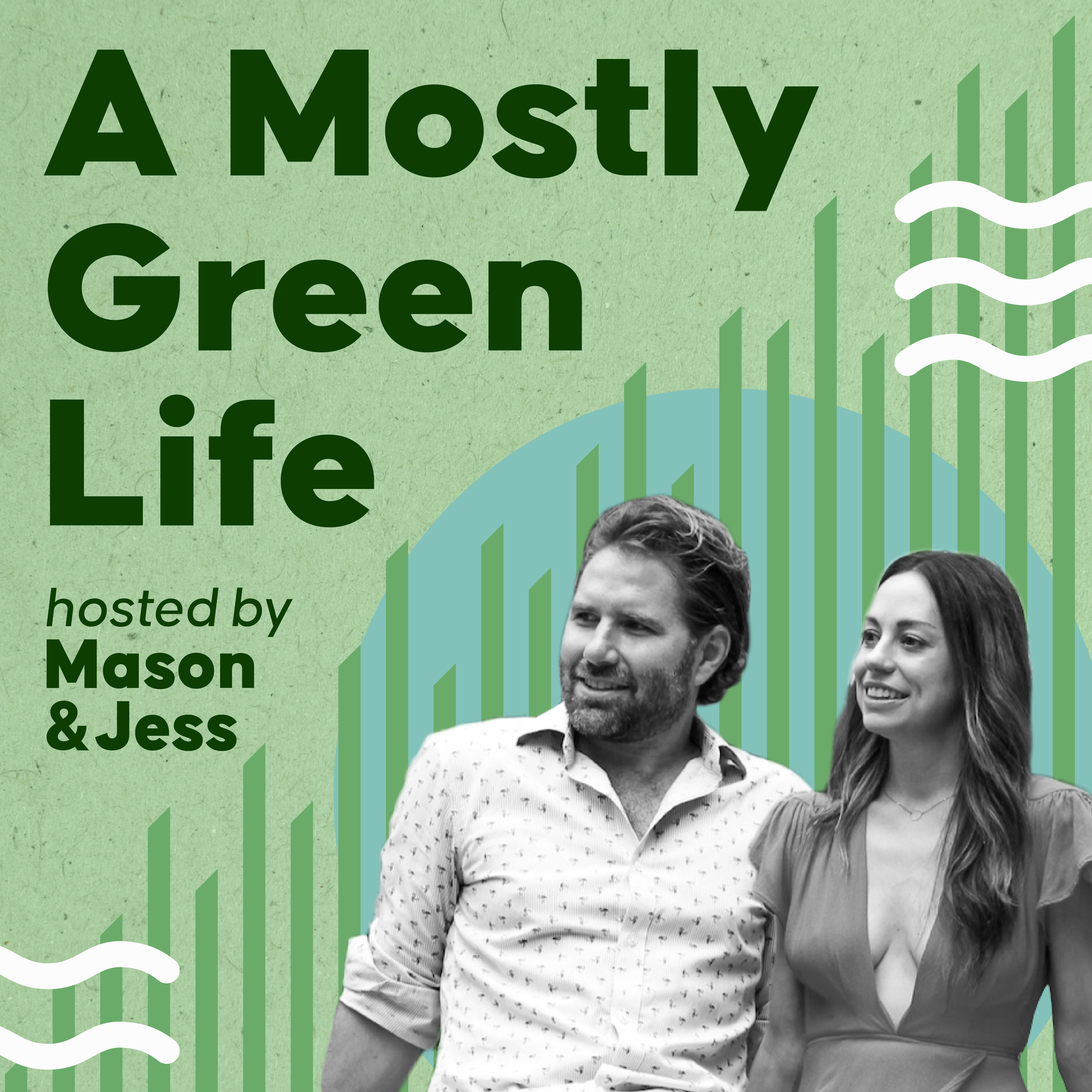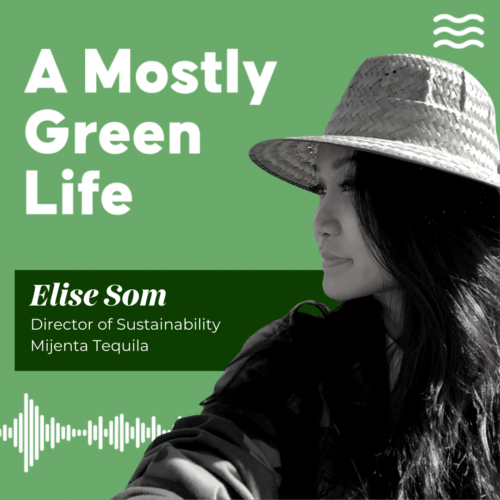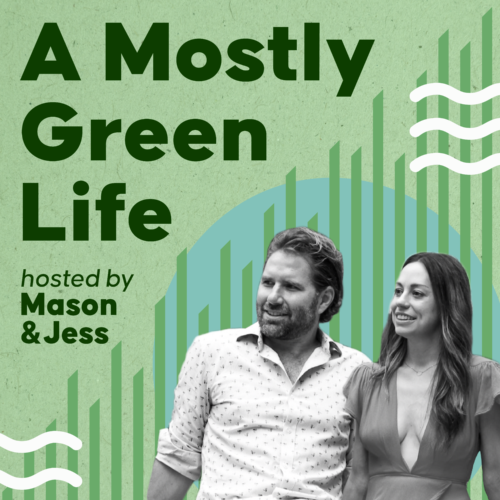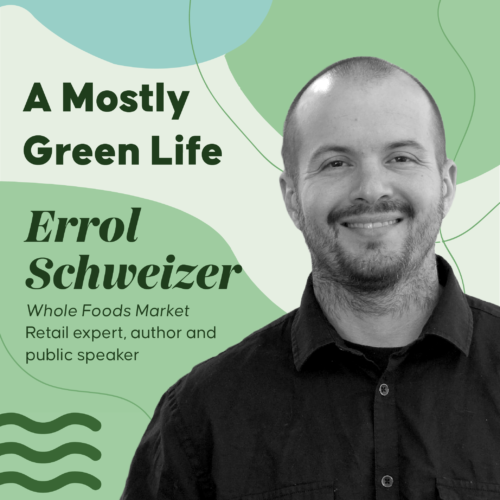If you missed an episode or two or just want the abbreviated version of them, Jess & Mason reminisce on their guests and what they learned from them during Earth Month.
Show Notes:
Explore Finch & their product insights https://choosefinch.com/
Finch Chrome Extension shortcut – https://chrome.google.com/webstore/detail/finch/alpclkolndblehcjooidjoplpbofofpl
Connect with Brandi Clark Burton – https://www.linkedin.com/in/ecobrandi/
Saving Us, the book by Katharine Hayhoe – https://amzn.to/3KKTasB
Check out The Austin Common – https://theaustincommon.com/
A bikini brand that gives a damn – https://www.houseofzz.us/
Learn about the efforts of the Sustainable Cannabis Coalition – https://www.sustainablecannabiscoalition.com/
Support and protect our beautiful hill country – https://hillcountryconservancy.org/
Pretty ok (not great) transcript:
[00:00:00] Jess: This is Justin Mason with a mostly green life. The podcast that’s making sustainability and our connection to the environment. More fun and approachable for the eco curious today, we’re recapping our recent episodes centered mostly around the planet. Earth day has come and gone. But as Brandy reminds us everyday should be earth day.
[00:00:16] Mason: We’ve got some actionable and easy insights and tips for doing a little better by old mother earth. Let’s start with Lizzie and her company Finch. She goes into incredible details about how it all works, but the gist of it is definitely installed their browser app.
So you can check the sustainability score. Of the things you buy regularly for your house and maybe see if there’s better options that still do the job for you, especially if you’re an Amazon shopper it’s seamless on that site. And
[00:00:44] Jess: we have, yeah, we installed this app and immediately switched several things.
I mean, it was our toilet paper. We switched right. Sponges and then even trash bags. I think you made that purchase. I don’t quite remember that one with the trash bags and I’ve got a link saved for when we replace our sheets and towels to perfect. So Finch, they really do all of the hard work for you.
And honestly, I think it’s one of the most impactful things that we’ve done recently, um, in our house, it just covers so much for what we buy and it’s so dang
[00:01:11] Mason: easy. Yeah. I really was surprised that how impactful that one was and you just look at the scores and it’s got the products there. And I feel like when you’re looking for better products, it can be hard to then.
If, you know, this trash bag is probably not the best trash bag is hard to then go find it, but it’s all right there on Amazon. And it’s the scores of the other things compared to it. Now it is, um, what did she say? It is relative. So there are some product categories where it’s nothing is good for the environment, but you can still make the best choices.
Right.
[00:01:44] Jess: Absolutely. So you can head on over to their website, www choose finch.com. That’s www choose C H O O S E Finch, F I N C h.com. And from there you can download the Chrome
[00:01:58] Mason: extension and it’s completely free. We don’t, we don’t get paid by that. And we’re not earning anything here and you don’t have to pay anything either.
They have a team of scientists digging deep into sustainability, not just the materials, because some things can say, Hey, this is a bamboo. You know, this is a bamboo thing for your bathroom, but how is it made and what energy went into it? And all these other factors, which I think is what’s 26 points that they investigate and products across 85 categories or something like that.
And they continually expand. So after. We had probably our densest episode of tips as consumers with Brandy Clark Burton. She is just so passionate about the environment and really does a great job of connecting individual action with overall goals. She crew she’s created many tools and resources over the years for people to get involved and take
[00:02:54] Jess: action.
Yeah, for sure. And I think one of her best points was that while some individual actions are not going to make a huge difference, it’s about the message that you’re sending to your spheres of influence, you know, It’s worth it to bring reusables to events or to offer, to take back recyclables. If it’s not available, just to show others that.
If you care, you know, the people around you, they’re going to care a little bit more and I’ve seen it firsthand with family and friends. And it’s so heartwarming when somebody close to you goes a little out of their way to be friendlier to the environment, knowing that it’s mainly important to you, but then they also feel great about it too.
[00:03:24] Mason: Yeah, that’s really cool. A cool site. She shared was rare.org, R a R e.org. The leading behavior change organization and the conservation world, they have a people-centered approach rooted in behavioral and social science and design thinking. Which makes environment and climate friendly behaviors, easier to adopt and their impact longer-lasting you can head to their website to learn more about the organization and to donate to their cause a cool book.
She’s shared though. Disclaimer, we haven’t quite checked it out. We haven’t picked it up and read this yet is called saving us by Katharine Hayhoe, which we’ll include in these show notes as
[00:04:06] Jess: well.
Another great resource is the draw down project. They did massive research and publish a book detailing the most impactful things people can do to affect climate change. The website is www.drawdown.org. That’s D R a w D O w n.org. Some of them are big commercial or industrial solutions, but who knows, maybe you’re in that industry.
Vegan diets are high on the list, along with how we choose to get our energy in our home. Check it out and see if you get any inspiration.
[00:04:35] Mason: Brandy is a co-founder of the Austin comments.
So if you live in Austin, check out www.theaustincommon.com to discover new ways to connect to Austin civic community with their community. Featuring events from dozens of local nonprofits and advocacy groups. She’s currently the chief inspiration officer of eco networking, which provides strategic consulting, market research and business development for green businesses.
That’s a mouthful and helps small to mid-sized businesses improve their social and environmental track record. She’s an amazing person and easy to get in touch with. We’ll include her LinkedIn, if you want to get in touch with her and put her to work for your business.
Next we had house of ZZ, sustainable, and ethical swimwear brand that Jessica has wanted to have on the show ever since we started it never addressed.
[00:05:27] Jess: Yes, that’s true. I’m obsessed. They doubt themselves as a bikini brand. That gives a damn and their suits are so cute.
They’ve been my go-to for the past year and I’ve also enjoyed incorporating some of the pieces into casual wear, like with a skirt or shorts,
[00:05:40] Mason: I’d say more than cute. They’re hot. These bikinis. That’s
[00:05:43] Jess: true. I love that they’re in Austin based brand first and foremost, but most importantly, I love their brand ethos and how they got to.
How they’ve gone about choosing their fabrics, manufacturing facility and even the packaging materials they send it in. Yeah.
[00:05:57] Mason: I learned a lot from that episode and I really, it was fascinating how much care they have taken and their selection, things that I didn’t even realize. You know, issues that would come up and they really approached everything from the right way.
So that was a lot of fun and it was cool to learn that their fabrics are derived from industrial plastic waste, unused fabric, scraps, fishing nets, carpets, and other materials. You can’t tell at all that they are this and it’s, uh, uh, you know, it’s really cool
[00:06:26] Jess: fabric. Yeah. And it turns into an even higher quality fabric than what all of the original materials were derived from.
Um, I think online, and I guess I can attest to this as well. Um, with their swimsuits, they. Like sunscreen doesn’t rub off as much in the chlorine. Hasn’t affected it as much. And so they’re able to like spin up this really high
quality
[00:06:46] Mason: protein. Wow. Interesting.
Yeah. When they said about that, the nylon is infinitely recyclable. I didn’t believe it. And I dug in and did some research and it really does seem like nylon in particular. There’s a lot of plastics that break down each time you use them. And so they’re not recyclable a ton of times, but it seems like nylon is however they.
They’re able to do it. And we didn’t even get into the topic of microplastics. One third of microplastic pollution can be attributed to clothing from us, washing our clothes. Like we all have to do. And those microplastics are entering our waterways, which eventually lead to the ocean.
[00:07:23] Jess: yeah. It’s insane to consider as well.
That 60% of all clothing made today is derived from
[00:07:27] Mason: plastic. It really is. I assumed it was still mostly cotton, but man, I mean, and I guess.
[00:07:36] Jess: That’s true. So a big takeaway, less is more shopping. Secondhand is a great way to cut back on consumption and you can go to thrift stores or companies like throw it up to buy products that are previously used borrowing from friends or family.
And if you are buying new support companies that are going the extra mile to ensure they’re sourcing. Sustainably and ask yourself if you’re going to wear it. I don’t know, like 20 times or more.
[00:07:58] Mason: Yeah, that should be a minimum. The
[00:08:00] Jess: average article of clothing is only worn seven times in the us. It’s 120 times globally, but here in the U
[00:08:06] Mason: S it’s it’s insane.
So let’s
[00:08:09] Jess: be better than that average. Yeah.
[00:08:10] Mason: Yeah. It’s a low bar, but let’s be better. Next. We took a little journey through cannabinoids was Sean Cooney of the sustainable cannabis coalition. That episode dropped on four 20 and it was very interesting to learn that sustainability is really just now starting to even be quantified in the industry.
They’re in the, write it down and do better next time phase of standards.
[00:08:35] Jess: Yeah. And it’s insane that there’s literally no transparency at all for consumers at the dispensary’s it seems like if you’re smoking something, you should be able to know where it’s from and what’s in it. Yeah. And
[00:08:44] Mason: I, I just can’t even believe that companies aren’t doing that.
I guess when we go to the dispensary though, it’s still new enough when we’ve gone. We’re just like, well, I mean, give me the good stuff, please. Well,
[00:08:58] Jess: If a company would just put it on their packaging, how much more would that sell? I mean, I dunno, I guess who the average consumer is,
[00:09:04] Mason: but, and it should be, cause you’re literally smoking it.
Can you give
[00:09:08] Jess: us that organic marijuana? You know, I think people would opt for that since they are smoking it.
[00:09:15] Mason: And yeah, it that’s just nuts. Uh, and his closing point about asking the next question, I think is one of the cooler and most impactful for me, make sure it suits your experience when you’re ordering.
We had in particular or when you’re ordering anything, make sure it does its job. But then ask that next question. Where was this grown? How was this grown? Where was this made? And it doesn’t need to be all of those questions, but one of them ask one more question about sustainability. And that really is how a lot of standards and industries move forward.
With consumers asking questions that then get asked of the vendors that then get asked to the producers and you just might be able to make some money. Yeah, for
[00:09:57] Jess: sure. And it’s applicable across all industries, whether it’s clothes or cars or food. Just ask that next question and and know that it puts it into the conversation.
[00:10:05] Mason: Yeah. I think even sex toys, I think we did ask,
[00:10:08] Jess: We did ask Lily from afterglow and she mentioned the sustainability around sex toys. It was just that you use them for a long time. Like they’re very durable and they last a long time. I don’t think she knew much about like what went into the production of it, but it was mainly that it wasn’t.
I mean,
[00:10:23] Mason: every sex toy we bought was in some huge plastic container. So it could be changed. That can be changed.
I will definitely also, I guess there are other drugs too, besides cannabis, we should be asking supply chain questions about, but that might get us into some trouble depending on the jug. So maybe we don’t always ask the next question, but I do remember when we started this podcast, I had an idea to do an episode about illicit substances and see if we could track recreational drugs to their source and understand quality safety, sustainability.
You didn’t seem too interested in that. Just so if any listeners think we should attempt it, let us know, reach out and say, you want us to do that episode. And then I will start my research on elicit substances
[00:11:07] Jess: And last but not least is our beloved friend, George Cofer. I just loved being around him and his wife, Mary Elizabeth, and their daughter. Hannah. They’re just a great family.
[00:11:14] Mason: They’re all just great humans. He’s truly a Renaissance man and has been able to find common ground. I think with anyone he ever talks to and effectively communicates his ideas and influences the people around them.
I honestly have to wish I had recorders when I hang out with him and remember his one-liners and answers to questions because they’re always just so funny and wise, he’s a great guy. And a mentor and a really good example of someone who enjoys life while also doing right by the planet.
The concept of a conservation easement, which he has spent most of his career working. Probably isn’t applicable to a lot of people in their life, but I promise you it will come up in elections occasionally. And I think it’s a really cool concept for everyone to be aware of there’s federal dollars for these easements, which there should be more of, and we’ll probably be voted on at times there’s state dollars,
which there should be more of and will be voted on occasionally and people can support hill, country Conservancy or their counterparts wherever you are directly. If you have land around you that you want to see protected forever. Tell everyone around you about conservation. Okay.
[00:12:20] Jess: Yes. And I immediately thought of my parents and their land.
I’m sure lots of people are connected to private ranches somehow. Well, at least in Texas, right? At least enough that it’s worth sharing such a cool way to help the environment, but backing up a bit. What exactly is that? What exactly is a conservation easement again, reason.
[00:12:37] Mason: Well, I’m so glad you asked Jessica.
Sure. It is a legal contract. So it’s filed in the courts. I think state or county. I think he mentioned state. I forget exactly which, but either way it is enforceable for whoever the landowner in perpetuity, the landowner voluntarily gives up there. To do whatever they want with the land in exchange for tax breaks, protection from developers and often even compensation.
It’s a contract. In perpetuity, meaning forever your kids and grandkids can’t reverse these contracts. So he kept talking about everyone needs to have lots of conversations around it. Make sure you don’t, you know, divide your family up by doing this kind of thing. You
[00:13:24] Jess: didn’t change them every
[00:13:24] Mason: five years.
Yeah. And you can still do some things, you just list what you want to be able to do with them. Like have your kids. Build houses or have different revenue streams grow marijuana. If you want you list those out. But in the end, the contract has to benefit natural environment and the environment around you.
And so if it doesn’t. Clearly benefit nature, then it just won’t be approved by the courts. He mentioned early on people put golf courses on conservation easements. And luckily that cuts squashed because while they are very pretty and they’re very green, not much at all about a golf course is a natural ecosystem, but these contracts help preserve nature on private land.
[00:14:10] Jess: Very cool episode. So just something to keep in mind, as we all progress on our journeys to help the environment.
And I guess that’s it, huh? Yeah. I think that was it. We learn. Yeah. We learned so much and we’re applying lots of these lessons to our lives and hope you get a little inspiration in yours too. Obviously, if you want to learn more about any topic, just go back to that episode. And we’d love to hear from you.
If you make any changes that you feel good about, hit us up on instagram@mostlygreen.life
[00:14:33] Mason: and coming up, we’re going to head back into food and beverage, probably our favorite topic mixed in with some important summer topics like sunscreen. Jess have had so much fun exploring these topics with you.
I always appreciate your questions and curiosity.
[00:14:48] Jess: Um, Mason scripted something for me to say next. And it was funny. You’re an amazing person to me. Read the script. I didn’t read it. No. All right. Thanks
[00:15:00] Mason: for listening.
Check out our other clean eating podcasts – https://mostlygreenlif.wpengine.com/podcasts





